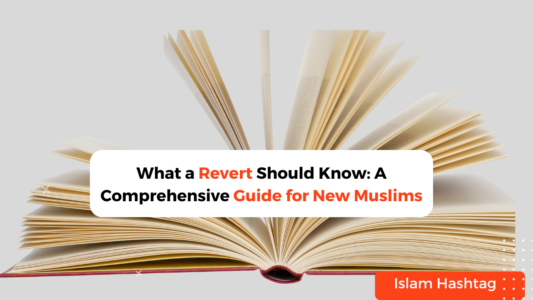What a Revert Muslim Should Know
Embracing Islam is more than just a change in faith; it’s a step toward finding peace, clarity, and purpose in life.If you’ve recently accepted Islam, let me tell you: this is not just the beginning of a new path but the opening of your heart to unending blessings and guidance.
The road ahead might seem unfamiliar, but it’s filled with beauty. Imagine discovering the sweetness of a prayer at dawn or feeling your heart soften when you hear the Quran. As your sister in deen, I want to welcome you and share how you can navigate this beautiful new chapter.
For many new Muslims, navigating this spiritual journey can feel overwhelming. The internet is full of information—some accurate, some conflicting—and advice from fellow Muslims may not always align with Islamic teachings. In this guide, we’ll simplify your path by providing essential steps to help you grow in faith, practice Islam with confidence, and find peace in your new identity.

1. Understanding the Essence of Islam
Islam is more than just acknowledging the existence of one God (Allah). It’s about consciously submitting to Him in all aspects of life. This submission is what transforms your beliefs into actions, making Islam a holistic way of life.
If you’re still exploring the purpose of life and why Islam is the right path, this short video on the Purpose of Life might provide clarity.
2. How to Officially Convert to Islam?
Conversion to Islam is simple. All it requires is your sincere belief in the oneness of Allah and the prophethood of Rasul Allah ﷺ, followed by reciting the Shahadah:
“Ash-hadu an laa ilaaha il-lal-laah wa ash-hadu anna Muhammadan rasulul-laah.”
(I bear witness that there is no god but Allah, and I bear witness that Muhammad is the Messenger of Allah.)
This declaration confirms your entry into Islam. Sahada is not only pronouncing the words of Sahada by words but you have to submit yourself to the will of Allah because it is to Allah we belong and to Allah we will return.
3. Begin with the Basics: The Quran and Sunnah
The Quran: Your Ultimate Guide
The Quran is the direct speech of Allah, revealed to Rasul Allah ﷺ through the angel Jibreel (Gabriel). It’s a comprehensive guide for all aspects of life and the first source of Islamic teachings.
- Why Read the Quran?
The Quran provides peace and guidance. Its recitation soothes the heart and strengthens faith. If you’re new to Islam, start by listening to its recitation. Apps like Quran Explorer or Muslim Pro offer easy access to the Quran in Arabic and translated languages. - Understanding the Quran:
The Quran is available in various formats:- Mushaf:Quran in Arabic
- Quran with Translation: Arabic verses alongside their meanings in your language.
- Tafsir (Explanation): In-depth commentary that explains the reasons for revelation and historical context. A recommended tafsir for English readers is Tafsir ibn Kathir
Hadith:

Hadith or athar is a form of Islamic oral tradition containing the purported words, actions, and the silent approvals of the prophet Muhammad. Follow our Page in Facebook to read authentic hadith
4. Building Connection with Allah
Daily Prayers (Salah)
Prayer is the cornerstone of a Muslim’s life, offering peace and discipline. As a new Muslim:
- Learn the essentials of prayer step by step. Attending a local mosque can help.
- Start with short Surahs, like Surah Al-Fatiha, and recite them in your prayers.
- See this prayer guide- How to pray
Reading the Quran
The Quran is not just a book; it’s Allah’s message to you.
- Begin with translations in your native language to understand its wisdom.
- Listen to recitations by renowned Qaris, like Sheikh Mishary Rashid Alafasy, to feel its spiritual beauty.
5. Learn and Practice the Five Pillars of Islam
The five pillars provide the foundation of a Muslim’s faith and practice:
1) Shahadah (Declaration of Faith)
The Shahadah is not just a verbal declaration; it’s a commitment to live by the principles of Islam.
2) Salah (Prayer)
Prayer connects you with Allah. Start by learning the basic steps of Salah. Join congregational prayers at your local masjid to experience the beauty of unity in worship.
3) Zakat (Charity)
zakat is giving 2.5% of your savings annually purifies your wealth and supports those in need. Learn more about the calculation and distribution of Zakat through trusted Islamic resources. Read why Muslim give Zakat
4) Sawm (Fasting)
Fasting during Ramadan is obligatory for every able Muslim. It’s a time of self-discipline and spiritual growth.
5) Hajj (Pilgrimage)
Hajj is a once-in-a-lifetime obligation for those who are physically and financially able. Until then, you can perform Umrah to experience the spiritual blessings of visiting the holy cities of Makkah and Madinah.
6. The Role of Halal and Haram in a Muslim’s Life
One of the most distinctive aspects of Islam is its emphasis on living a pure and wholesome life. This is achieved by adhering to what is Halal (permissible) and avoiding what is Haram (forbidden).
What is Halal?
- Halal encompasses everything lawful in Islam, from food and clothing to actions and relationships.
- Choosing Halal ensures that your deeds align with Allah’s commands, earning you His pleasure.
Examples:
- Consuming Halal food, such as meat slaughtered in the name of Allah.
- Earning an honest living through ethical means.
What is Haram?
- Haram includes anything explicitly forbidden by Allah or His Messenger ﷺ, as it harms your soul or society.
Examples:
- Consuming intoxicants like alcohol.
- Engaging in dishonesty or interest-based transactions.
Making Halal Choices
Living a Halal life might feel daunting initially, especially in non-Muslim societies. Start small:
- Shop for Halal-certified products.
- Seek ethical and interest-free financial options.
- Be mindful of your intentions, as Allah rewards every sincere effort.
7. Building Knowledge: Surround Yourself with Resources
Islamic Books and Apps
- Books: Start with beginner-friendly resources. Start with these resources
- Apps: Install Quran apps and prayer apps .
Ramadan Reading List/Ramadan Reads: Islamic Books to learn about Islam
Online Courses
Many platforms offer free and paid courses for new Muslims. We have a FREE course for reverts starting in January 2025. In sha Allah.If you want to register, you can send us an email at admin@islamhashtag.com.
8. Finding Your Community
Finding a Muslim Community
Islam encourages unity and brotherhood. Having a supportive Muslim community can make your journey easier:
- Visit a local mosque or Islamic center.
- Join online forums or social media groups for new Muslims.
- Participate in halaqas (study circles) to deepen your knowledge and make friends.
Remember, the Muslim community is vast and diverse, and you will find people who understand your struggles and celebrate your victories.
9. Practical Tips for Daily Life
Modesty in Clothing and Behavior
Islam emphasizes modesty as a means of safeguarding dignity:
- For women: Wear clothing that covers the body and is not tight or revealing.We need to cover our body. Keeping the Face, Palms and feet are allowed.
- For men: Dress modestly. The area that needs to be covered for men is navel to knees. So they must not be exposed. One should ensure to maintain dignity in appearance.
Charity and Good Deeds
Small acts of kindness, like helping a neighbor or donating to a cause, are highly rewarded in Islam. As the Prophet ﷺ said:
“Charity does not decrease wealth.” (Sahih Muslim)
10. Overcoming Challenges as a New Muslim
Adapting to a New Lifestyle
The transition to an Islamic way of life can be challenging. Give yourself time to adjust, and don’t be too hard on yourself. Allah loves consistency, even if your efforts are small.
Dealing with Misconceptions
In a world filled with stereotypes, you may face questions or even criticism about your faith. Equip yourself with knowledge and respond with kindness.
Spiritual Growth Through Worship
Islam is a journey of constant growth:
- Dua (Supplication): Speak to Allah in your own words. He listens and responds.
- Dhikr (Remembrance): Recite phrases like SubhanAllah (Glory be to Allah) or Alhamdulillah (Praise be to Allah) to keep your heart connected to Him.
11. The Importance of Gratitude
One of the most beautiful aspects of Islam is its focus on gratitude. Acknowledge the blessings Allah has given you, big or small.
As the Quran states:
“If you are grateful, I will surely increase you [in favor].” (Surah Ibrahim 14:7)
Quran Verses about Zakat and Charity
12 Navigating Life as a Muslim in a Non-Muslim Society
Living as a Muslim in a predominantly non-Muslim environment comes with unique challenges:
- Maintain Your Identity: Be confident in your faith while respecting others.
- Build a Routine: Establish Islamic practices like prayer and Halal choices in your daily life.
- Be a Positive Example: Show the beauty of Islam through your actions and character.
Final Thoughts
This is the beginning of a beautiful journey—one that brings you closer to your Creator and allows you to experience the sweetness of faith. Remember that every Muslim, new or born into the faith, is constantly striving to become better.
Take things one step at a time, trust in Allah’s plan for you, and never hesitate to seek guidance from your Muslim brothers and sisters. Welcome to the Ummah—you are home now.
Discover more from Islam Hashtag
Subscribe to get the latest posts sent to your email.




